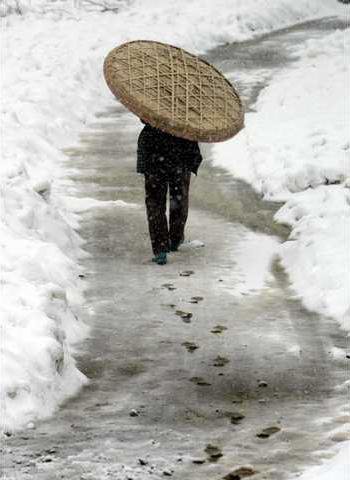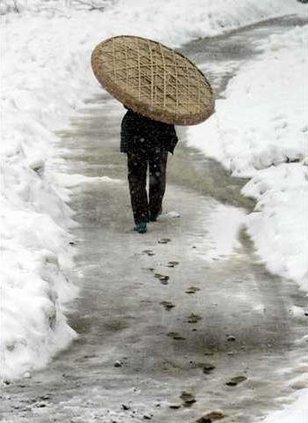GUANGZHOU, China — Hu Qingyuan camped out Friday, waiting for a train to take him home for the Chinese New Year holiday — his only chance each year to see his wife and 8-year-old son.
At a shopping mall not far away, throngs of middle-class Chinese tried on Nike running shoes, browsed for Swatch watches and ate at McDonald’s.
The shoppers seemed light years away from the working masses waiting in the cold rain at the train station in the bustling southern city of Guangzhou.
Dizzying contrasts are on display as China prepares for a holiday that could be spoiled for millions by the worst snowstorms in decades. The freakish weather in southern and eastern China has killed at least 60 people, stranded 5.8 million railway passengers and causing $7.5 billion in damages.
Among the victims are Hu and the millions of other Chinese workers who make most of the things sold at Guangzhou’s trendy Update Mall.
‘‘I’ve already been waiting here for four days, and I have no idea when I’ll be going,’’ said Hu, a 35-year-old factory worker who wore a navy polyester suit and tan turtleneck for his trip home.
Workers like him leave villages to work in the factories that supply the world with everything from laptops and bicycles to jeans and cars. They are tethered to assembly lines all day and spend nights in crowded, dank dormitories.
But despite their key role in China’s rip-roaring economic growth of the past 30 years, migrant workers are often despised by the locals in wealthy cities like Guangzhou — the capital of booming Guangdong province.
The semiliterate laborers can’t speak the local dialect, Cantonese, and they’re treated like bumpkins. Gangsters prey on them, trying to cheat them out of the money they save to send home. Some factory owners fail to pay their wages and ignore the labor law.
One of the brightest spots in the workers’ dreary lives is the Lunar New Year holiday, which starts Feb. 7 this year. But since the snowstorms knocked out sections of the rail system, the government has been urging the migrants to cash in their tickets and spend the holiday at their workplaces. About 11 million of the 19 million migrant workers in Guangdong have received refunds for their tickets, the official Xinhua News Agency reported.
But doing so was unthinkable for Hu, who said he earns $280 a month working in a furniture factory.
‘‘I would never stay here for New Years. I don’t care how long I need to wait for a train. I’m going home,’’ said Hu, whose square jaw, thick hair and long sideburns made him resemble the late martial arts star Bruce Lee.
He chain-smoked as he sat on the sidewalk littered with orange peels and discarded red wrappers that said ‘‘Good Luck Cookies’’ in gold lettering.
A half-mile stretch of the boulevard leading to the train station was packed with people. Officials said about 200,000 people were waiting for the trains, which resumed normal service Thursday.
Hu said the trip to his home in central Hubei province would take about 17 hours. He doubted there would be room on the wooden benches that serve as seats and expected to stand in a packed, unheated car for the entire trip.
Hu said he had to be back to the factory by Feb. 16. His employer would not allow him to extend his holiday even though the storm delayed his departure.
‘‘I might be able to come back a day or two late, but if I extended my holiday by a week, I wouldn’t have a job,’’ he said.
Hu’s colleague, who would only give his surname, Zhang, said the factory did not follow the labor law, which sets standards for hours and overtime pay.
‘‘The labor law is just something high-level officials talk about. The law is what our boss says it is,’’ Zhang said. ‘‘Sometimes we work 31 days a month. If there are goods to be made, then we keep making them.’’
At a shopping mall not far away, throngs of middle-class Chinese tried on Nike running shoes, browsed for Swatch watches and ate at McDonald’s.
The shoppers seemed light years away from the working masses waiting in the cold rain at the train station in the bustling southern city of Guangzhou.
Dizzying contrasts are on display as China prepares for a holiday that could be spoiled for millions by the worst snowstorms in decades. The freakish weather in southern and eastern China has killed at least 60 people, stranded 5.8 million railway passengers and causing $7.5 billion in damages.
Among the victims are Hu and the millions of other Chinese workers who make most of the things sold at Guangzhou’s trendy Update Mall.
‘‘I’ve already been waiting here for four days, and I have no idea when I’ll be going,’’ said Hu, a 35-year-old factory worker who wore a navy polyester suit and tan turtleneck for his trip home.
Workers like him leave villages to work in the factories that supply the world with everything from laptops and bicycles to jeans and cars. They are tethered to assembly lines all day and spend nights in crowded, dank dormitories.
But despite their key role in China’s rip-roaring economic growth of the past 30 years, migrant workers are often despised by the locals in wealthy cities like Guangzhou — the capital of booming Guangdong province.
The semiliterate laborers can’t speak the local dialect, Cantonese, and they’re treated like bumpkins. Gangsters prey on them, trying to cheat them out of the money they save to send home. Some factory owners fail to pay their wages and ignore the labor law.
One of the brightest spots in the workers’ dreary lives is the Lunar New Year holiday, which starts Feb. 7 this year. But since the snowstorms knocked out sections of the rail system, the government has been urging the migrants to cash in their tickets and spend the holiday at their workplaces. About 11 million of the 19 million migrant workers in Guangdong have received refunds for their tickets, the official Xinhua News Agency reported.
But doing so was unthinkable for Hu, who said he earns $280 a month working in a furniture factory.
‘‘I would never stay here for New Years. I don’t care how long I need to wait for a train. I’m going home,’’ said Hu, whose square jaw, thick hair and long sideburns made him resemble the late martial arts star Bruce Lee.
He chain-smoked as he sat on the sidewalk littered with orange peels and discarded red wrappers that said ‘‘Good Luck Cookies’’ in gold lettering.
A half-mile stretch of the boulevard leading to the train station was packed with people. Officials said about 200,000 people were waiting for the trains, which resumed normal service Thursday.
Hu said the trip to his home in central Hubei province would take about 17 hours. He doubted there would be room on the wooden benches that serve as seats and expected to stand in a packed, unheated car for the entire trip.
Hu said he had to be back to the factory by Feb. 16. His employer would not allow him to extend his holiday even though the storm delayed his departure.
‘‘I might be able to come back a day or two late, but if I extended my holiday by a week, I wouldn’t have a job,’’ he said.
Hu’s colleague, who would only give his surname, Zhang, said the factory did not follow the labor law, which sets standards for hours and overtime pay.
‘‘The labor law is just something high-level officials talk about. The law is what our boss says it is,’’ Zhang said. ‘‘Sometimes we work 31 days a month. If there are goods to be made, then we keep making them.’’

